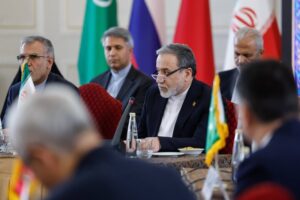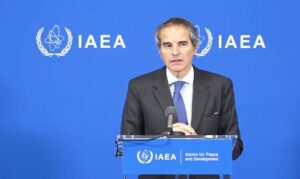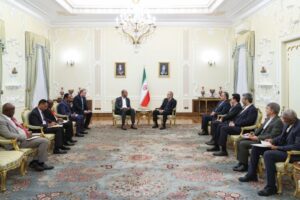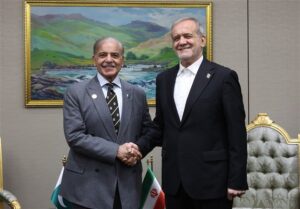According to the Persian version of IRNA, the report titled “Leave Israel Alone: How Escalation With Iran Has Divided Trump’s Base” reads: After being sworn in for a second term in January, U.S. President Donald Trump announced his intention to “end all wars” and leave behind a legacy as a “peacemaker and unifier.” But six months later, missiles are flying across the Middle East after Israel attacked Iran, raising the risk of a full-scale regional war that could draw U.S. forces into the conflict.
Israel’s attacks on Iran—implicitly supported by Donald Trump—are now putting the president’s pledge to advance peace to the test. These attacks have also sparked division within Trump’s base, with many right-wing politicians and commentators emphasizing that unconditional support for Israel contradicts the “America First” platform on which Trump was elected.
Trita Parsi, Executive Vice President of the Quincy Institute, a U.S.-based think tank advocating diplomacy, said: “There is a strong sense of betrayal and anger in many parts of the ‘America First’ base because they genuinely oppose the idea of the U.S. intervening in or supporting such wars.”
He added: “They have grown generally skeptical of Israel and strongly believe these kinds of wars end up sinking Republican presidencies and jeopardizing their broader domestic agendas.”
“Leave Israel Alone”
Several conservatives questioned Israel’s attacks on Friday and warned that the U.S. should not be dragged into a war that doesn’t serve its interests. Tucker Carlson, a prominent conservative commentator and a key figure in Trump’s “Make America Great Again” (MAGA) movement, said the U.S. should not support Israeli Prime Minister Benjamin Netanyahu’s “war-hungry government.”
Carlson’s morning newsletter on Friday stated: “If Israel wants to start this war, it has every right to do so. It is a sovereign country and can do whatever it wants. But not with America’s support.” The newsletter warned the war with Iran could “breed the next generation of terrorism” or result in the deaths of thousands of Americans for the sake of a foreign agenda. It concluded: “Clearly, none of these outcomes serve U.S. interests. But there is another option: leave Israel alone. Let them fight their own wars.”
Republican Senator Rand Paul also warned against war with Iran and criticized pro-war conservatives in Washington. Paul wrote on social media: “The American people overwhelmingly oppose our endless wars—that’s why they voted for Donald Trump in 2024.” He added: “I urge President Trump to stay the course, put America first, and not engage in any war between foreign nations.”
Far-right Congresswoman Marjorie Taylor Greene also expressed opposition to the attacks. She had previously warned Trump not to strike Iran based on Israel’s claims that Tehran was close to acquiring nuclear weapons. On X, she wrote: “I’m praying for peace. Peace. That is my official position.”
While many Israel supporters cite the threat of a nuclear-armed Iran, Tehran has long denied pursuing nuclear weapons. Tulsi Gabbard, Trump’s Director of Intelligence, testified in March that the U.S. “continues to assess that Iran is not building a nuclear weapon.”
Charlie Kirk, a major Republican activist and staunch Israel supporter, also voiced skepticism over the U.S. getting involved in war with Iran. On his podcast, Kirk said: “I can tell you our MAGA base does not want any wars. They do not want the U.S. involved. They don’t want the U.S. entangled in this.”
Israel’s Attacks
Just hours before Israel launched airstrikes on Iran Friday—targeting military bases, nuclear facilities, and residential buildings—Trump had said his administration was committed to diplomacy with Tehran.
At a Thursday press conference, Trump said: “Look, it’s very simple. It’s not complicated. Iran cannot have a nuclear weapon. Other than that, I want them to succeed. We’ll help them succeed.”
The sixth round of nuclear disarmament talks between American and Iranian officials had been scheduled for Sunday in Oman.
However, on Friday, Trump told reporters he had known in advance about the Israeli attacks. He did not indicate that he vetoed the bombing campaign, although Secretary of State Marco Rubio described the action as “unilateral.” Instead, Trump blamed Iran, saying Iranian officials should have heeded his calls to agree to dismantle their nuclear program.
On social media, Trump wrote: “I told them it would be far worse than anything they know, expect, or have been told—that the United States has the best and deadliest military equipment in the world, by far, and Israel has a lot of it, with much more on the way.”
Parsi said that initially Trump had sought a deal with Iran, but his demand for Tehran to cease uranium enrichment led to a deadlock in negotiations. He told Al Jazeera: “Instead of pursuing negotiations reasonably, he adopted the goal of zero enrichment, which predictably led to deadlock—and predictably gave the Israelis the opportunity to push him toward military escalation.”
Parsi added he believes Trump engaged in deception last week by expressing support for diplomacy while knowing the Israeli strikes were imminent. He said: “Trump deliberately made statements in support of diplomacy and against an Israeli strike, making everyone believe that if there were to be an attack, it would happen after the six rounds of talks on Sunday. But it happened sooner.”
The “America First” Base
While the Israeli attacks drew some criticism in Congress, many Republicans and Democrats supported them. But a key segment of Trump’s support base—the right-wing faction questioning unconditional U.S. support for Israel—voiced opposition.
John Hoffman, a foreign policy and defense researcher at the libertarian Cato Institute, said: “They really represent a strong base within the Republican Party, especially when you look at younger voters.”
Hoffman cited a recent Pew Research Center poll showing that 50% of Republicans under 50 view Israel unfavorably. He told Al Jazeera: “Among voters themselves, Americans are tired of endless wars.”
Pro-interventionist “war hawks” dominated the Republican Party under President George W. Bush, who launched the invasions of Iraq and Afghanistan after the 9/11 attacks. But both conflicts proved disastrous. Thousands of U.S. soldiers were killed, and many others returned with lasting physical and psychological wounds.
Critics also questioned whether these wars advanced U.S. interests or set them back. For instance, nation-building in Iraq led to a pro-Iranian government and the rise of groups like ISIS, seen as threats to global security.
In Afghanistan, the Taliban returned to power in 2021—nearly two decades after being toppled by U.S. forces. The U.S.-backed Afghan government collapsed rapidly after the American withdrawal.
Trump capitalized on public anger over these conflicts during his 2024 campaign. On multiple occasions, he painted an alternative timeline in which, had he been president, Afghanistan’s collapse would never have happened.
At a rally in Detroit in October 2024, Trump said: “We didn’t have that horrific situation in Afghanistan—the most shameful moment in our country’s history.”
Trump also attacked his Democratic rival, Kamala Harris, for aligning with Dick Cheney, former Vice President under Bush, and his daughter Liz Cheney, calling them “warmongers.”
At another event in Novi, Michigan, Trump said: “Kamala is campaigning with Liz Cheney, a Muslim-hating warmonger who wants to bomb practically every Muslim country in the world.” He added that Dick Cheney “was responsible for the Middle East invasion” and “killed millions.”
But critics argue Trump’s stance on Israel’s strikes against Iran risks dragging him into yet another Middle Eastern war.
Hoffman, for instance, pointed to the U.S.–Israel relationship and the continued presence of long-time Iran hawks like Senator Lindsey Graham in the Republican Party. Hoffman said: “There’s a very real danger that the U.S. gets pulled into this war.”







